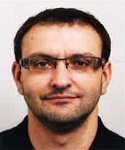| Biography | |
|---|---|
 Dr. Pascal Briois Université de Bourgogne Franche, France |
|
| Title: Surface Treatment for Fuel Cell Applications | |
| Abstract: Nowadays, it is well known that Solid Oxide Fuel Cells (SOFC) lifetime improvement and cost reduction can be controlled by decreasing their operating temperature. In the SOFC technology, the delivered power is obtained after an oxy-reduction reaction governed by the Nernst and the Arrhenius laws. In order to obtain the same electric power while reducing the operating temperature, two methods are possible. The first one consists in developing a new material with better properties in terms of conductivity, catalytic efficiency and so on while the second one is to reduce the thickness of each part of the fuel cell. In this work, we present some recent results on anode and metal supported cells. Each element of the unit cell (anode, electrolyte and cathode) was deposited by thin technologies. After a short description of the experimental configuration, the structural, microstructural and morphological features of the cell were determined by XRD and SEM. The electrical properties were evaluated by using Electrochemical Impedance Spectroscopy (EIS) technique as a function of the temperature. Finally, the I-V-P curves of the complete cell were conducted at different temperatures; Keyword: Coating, Dry processes, Fuel Cell | |
| Biography: Pascal Briois received the Master's degree in science and material engineering from Henri Poincaré University, Nancy, France, in 2002, and the Ph.D. degree in science and material engineering from the National Polytechnic Institute of Lorraine, Nancy, France, in 2005. He is currently an Associate Professor at University of Technology of Belfort-Montbéliard (UTBM). His main research areas include characterization and elaboration of SOFC/PCFC, sensors and catalysts by thin technology in particular reactive magnetron sputtering. Since 2002, he is member of the French research group on fuel cell and in 2020 he is member of board of French National H2 network to represent FEMTO-ST. In 2018, he becomes member in the steering committee of C’nano EST and he is the head of the SURFACE platform from UTBM. The surface platform is specialized in dry surface treatment (PVD) and the characterization of thin films. Since 2020, he is deputy director of Micro-Nano Science and Surfaces (MN2S) department of FEMTO-ST institute. He is the holder of the French research expertise bonus (PEDR) by the French Ministry of Higher Education and Research, member of the ElectroChemical Society since 2011. | |
